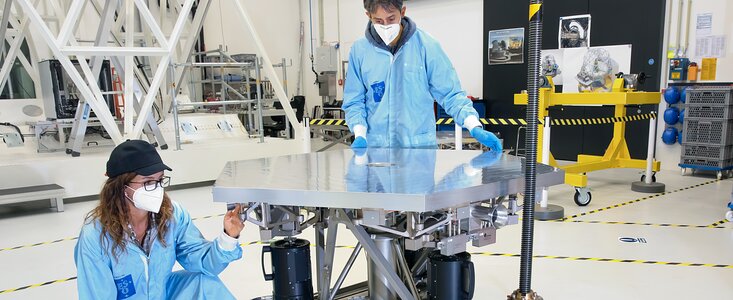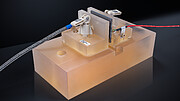Mitteilung
Konstruktions-Erfolge bei Aktoren und Sensoren des Hauptspiegels am ELT der ESO
24. November 2020
M1, der Hauptspiegel des Extrem Large Telescope (ELT) der ESO, rückt mit der Genehmigung des endgültigen Entwurfs für seine Kantensensoren näher an die Fertigstellung, und auch seine Positionsaktoren nähern sich diesem wichtigen Meilenstein. Die Sensoren und Aktoren sind entscheidend für die optische Qualität und Funktionalität des riesigen 39-Meter-Spiegels. Das ELT soll in diesem Jahrzehnt in der chilenischen Atacama-Wüste in Betrieb gehen.
Der Hauptspiegel des ELT, M1, besteht aus 798 sechseckigen Segmenten aus einem dünnen Glaskeramikmaterial. Um die optische Qualität des Spiegels sicherzustellen, müssen seine Segmente zusammenarbeiten, um die Form des Spiegels beizubehalten - trotz Änderungen der Position des Teleskops und der äußeren Bedingungen wie Temperatur, Druck und Wind. Bewegliche Stützen und Sensoren für den Spiegel, nämlich die M1-Positionsaktoren und Kantensensoren, ermöglichen es jedem Spiegelsegment, sich unabhängig und mit nanometrischer Präzision (1 Millionstel Millimeter) zu bewegen, und sind entscheidend für das Teleskop, um sein Potenzial auszuschöpfen.
M1 Positionsaktoren
Die M1-Segmentstützen liegen unter jedem der 798 Spiegelsegmente und verbinden jeden Spiegel mit der primären Spiegelstützzelle . Der erste Satz von M1 Segmentträgern , die von VDL ETG Projects BV hergestellt und auf hohe Präzision getestet wurden, wurde vor Kurzem an Safran REOSC in Poitiers, Frankreich, geliefert, wo die Spiegelsegmente poliert und zusammengebaut werden.
In Chile dann wird jedes einzelne Spiegelsegment mit einem Durchmesser von etwa 1,40 Metern und einem Gewicht von rund 250 kg mit seiner Tragstruktur auf drei Positionsaktoren installiert. Diese Aktoren passen die Position der Spiegelsegmente ständig durch winzige, präzise Bewegungen an.
Die Positionsaktoren geliefert werden von der deutschen Firma Physik Instrumente ( PI ) gebaut. Das Unternehmen ist auf Präzisionsmotorisierung und -positionierung spezialisiert und wird die erforderlichen 2394 Positionsaktoren herstellen, um die Segmente des ELT-Hauptspiegels punktgenau einzustellen. Das endgültige Design für diese hochpräzisen Aktoren steht kurz vor der Genehmigung. Die Serienfertigung beginnt, sobald die endgültige Designprüfung abgeschlossen ist.
M1 Kantensensoren
Eine weitere wichtige Komponente des Hauptspiegelsystems, die Kantensensoren, hat bereits ihre endgültige Entwurfsprüfung bestanden. Die M1-Kantensensoren, die vom FAMES-Konsortium (bestehend aus Fogale Nanotech in Frankreich und Micro-Epsilon in Deutschland) entwickelt und hergestellt werden, sind die präzisesten Kantensensoren , die jemals für ein Teleskop entwickelt wurden. Zwei Sensoren auf jeder Seite jedes Segments können erkennen, wenn sich die Segmente aus ihrer Position bewegen, selbst wenn es nur ein Millionstel Millimeter ist. Insgesamt 4608 Kantensensoren messen die relativen Positionen aller M1-Segmente, sodass die Gesamtform des Spiegels korrigiert werden kann, wenn sich die Segmente verschieben.
Angesichts der hohen Anzahl von Kantensensoren und Positionsaktoren, die sich aus der Größe des ELT ergeben, mussten die Unternehmen in der letzten Konstruktionsphase Dutzende Einheiten produzieren, um nicht nur die Produkte selbst, sondern auch ihre Herstellungs- und Produktionsprozesse sorgfältig zu testen und zu validieren . Mit Abschluss der endgültigen Entwurfsprüfung für die Kantensensoren, wird FAMES mit der Serienproduktion dieser wichtigen Teleskopkomponenten beginnen.
Mitte 2021 wird voraussichtlich die erste Charge von Kantensensoren und Positionsaktoren an die ELT Technical Facility in der chilenischen Atacama-Wüste geliefert, um sie in der Zukunft in die M1-Segmente einbauen zu können.
Links
Kontaktinformationen
Marc Cayrel
ESO
Garching bei München, Germany
Tel: +49 89 3200 6685
Email: mcayrel@eso.org
Bárbara Ferreira
ESO Public Information Officer
Garching bei München, Germany
Tel: +49 89 3200 6670
Cell: +49 151 241 664 00
Email: pio@eso.org
Über die Mitteilung
| ID: | ann20032 |



